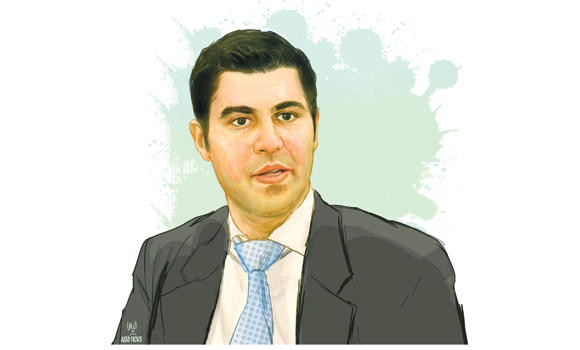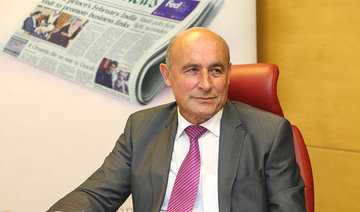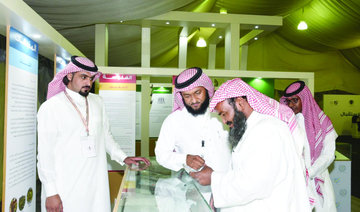I would love to chat about Saudi Arabia, says Parag Khanna.
It is an interesting use of the word “chat,” because conversations with Khanna are never teatime tittle-tattle. The 39-year-old author —born in India, educated in the UAE, Europe and America, currently living in Singapore, but really a citizen of the world, has weighty matters on his mind and is not afraid to approach profound and difficult subjects.
His latest book “Connectography,” published last year to much acclaim, is a sweeping review of the economic, social and technological forces that link the great trading centers of the world. In the tradition of the great “futurist” thinkers, like Alvin Toffler or Nassim Nicholas Taleb, it is an integrated theory of the world, no less than a roadmap for the future of mankind.
Saudi Arabia gets a mention, as a country under the influence of sudden wealth and technology, in a transition from the traditional to a more modern form. King Abdullah Economic City (KAEC), which Khanna visited in the course of researching the book, gets a significant section. But he does not drill down in depth into where Saudi Arabia stands in the “connectography” of the modern world.
An interview with Arab News is his opportunity. We have met previously, soon after the book was published, in the lobby of the Jumeirah Emirates Towers hotel in Dubai, where he described his worldview over coffee. But now, via e-mail and phone calls, I get the chance to find out where Saudi Arabia fits into that vision.
He believes that although Saudi Arabia is not yet a fully diversified economy, it is inextricably linked to the rest of the world, and especially the Middle East.
“Saudi (Arabia) is, of course, heavily connected to the world through energy markets. The recycling profits from energy, especially into Arab economies through foreign direct investment (FDI), and capital markets through investment in asset managers, are key roles. This has diminished lately as capital is repatriated because of lower oil prices and the economic strains they imposed. Then, of course, it is ‘connected’ to the world’s Muslims in strong ways, and certainly via the millions who come for Haj each year,” Khanna said.
In Saudi Arabia, there is a modernization movement going back a long time. It is an ongoing debate. Saudi Arabia is not North Korea. There is a discourse, a push and pull between different parts of society. Social media is part of that debate.
Globally connected societies
Can Saudi Arabia do this via the economic transformation program currently underway as part of the Vision 2030 strategy to reduce oil dependency?
“Most of the truly globally connected societies tend to have a bigger population than Saudi Arabia, which is relatively small compared to others globally and in the region. But countries like that can do it. I am thinking of a country like Malaysia, for example. It is an Islamic country that is investing in infrastructure in a big way. It is investing in education and inviting global companies to invest in it,” he said.
He continues: “I think countries that fail to modernize do so for one of two reasons — either they inflict problems upon themselves, or there are structural reasons. There are often geopolitical reasons for failure, outside their control.
“But Saudi Arabia practices a shrewd version of multi-alignments. They have good relations with Europe, Asia and the US. So, a thing like Saudi Aramco’s initial public offering (IPO), or the big sale of bonds we have seen recently, becomes a global event and links the country to the world,” he said.
But what if geopolitical factors — of which there are plenty in a volatile region like the Middle East — threaten to throw those plans off course?
“Saudi Arabia has partners in the world that can help it with problems like Iran, Syria and Yemen. The Gulf Cooperation Council (GCC) is a crucial bulwark of cooperation. The question of GCC monetary union is one of the critical issues that will have to be addressed at some stage. So I think that relatively small countries like Saudi Arabia can manage the transition to being a crucial part of the ‘connected’ world. I am cautiously optimistic Saudi Arabia can do it,” he said.
Ensuring social stability
The economic measures being taken — like the Saudi Aramco share sale and the privatization program of Vision 2030 — have deep social ramifications if they are seen through. The more traditional parts of Saudi society are being asked to modernize rapidly, and that might cause some tensions, I suggest. Can these proposals succeed?
“The plan is more to modernize the economy than the society, as the latter will certainly be a slower process. Since the population is still not very large, I believe it is feasible to create employment in tradable and non-tradable areas such as infrastructure, health care, education, logistics and so forth, which will be critical to broaden employment and diminish dependency on state subsidies,” he said.
On the question of social stability, Khanna is also optimistic. “Saudi Arabia has a strong, vertically integrated power structure. There are internal tensions between progressives and conservatives, but that is true of many countries and it does not necessarily lead to failure. For example, China has many internal problems, but it has not led to collapse and I do not think it will. Saudi Arabia will remain stable because of the structure of the state,” he said.
Some analysts have pointed to the potentially destabilizing effects of modern social media on a society like Saudi Arabia’s. On the one hand, social media can be a unifying force because of the connectivity and dialogue it enables between government, civil society and citizens. But it can also be a source of instability. As a leading advocate of the “connected” world, what does he think?
“The relationship (between social media and social dissent) is ambiguous since social media is also a platform used by conservative/traditional forces to reach (out to) existing and new audiences. So social media does not itself necessarily represent one type of view, like the liberal. Clearly, we know of many examples of Saudi youth using social media to express liberal values, which both emboldens them while also inviting a reaction.
“In Saudi Arabia, there is a modernization movement going back a long time. It is an ongoing debate. Saudi Arabia is not North Korea. There is a discourse, a push and pull between different parts of society. Social media is part of that debate,” Khanna said.
Global cities
In his book, cities are the dynamos of global growth and connectivity. The great urban hubs of the world often have higher rates of growth than their respective countries, and they form networks that capture commerce and investment. Does he think Saudi Arabia’s two big cities, Riyadh and Jeddah, can become part of the global elite?
“A global city has a formal definition: A city that is in the top tier for the global flows of goods, services, capital, people and data. Dubai is the only ‘global city’ in the region and has first-mover advantage, if you will. Riyadh will, of course, remain a major regional political and economic center, and Jeddah a crucial gateway. What really matters is that the county is promoting its cities,” he said.
“Jeddah is hugely important and will become more so. It is playing a big regional role. KAEC is a positive step and gives important momentum to that part of the country. It is competing to capture trade flows across strategic lanes. I think it is very plausible to see KAEC as the Jebel Ali of the Red Sea. Oman too is trying to do this.”
I ask whether Saudi Arabia can compete with more extrovert countries within the GCC, like the UAE and Qatar.
“It depends on what they want to compete for. In some arenas they have similar objectives, for example the strategic role across the region, and in others they diverge. In truth, GCC economies are more commercially integrated than their own leaders or official statistics would admit, given the flows of business within the region.”
As evidence, he refers to a map he produced entitled “Pax Arabia,” which shows energy and water infrastructure in the Middle East, promoting resource-sharing between resource-rich and resource-poor countries, something that could transform the Arab world into a collection of urban oases better connected to Europe.
Khanna is soon to demonstrate connectivity in a very practical way, by undertaking — in the company of his young daughter Zara — the longest railway journey in the world: The 7,000-mile trip between Scotland and Singapore.
“I don’t anticipate much drama in Europe, but the ‘Indiana Jones’ experience will begin in Turkey, then across Central Asia and down into South East Asia. It will take three months,” he said.
This time, Saudi Arabia and the other cities of the Arabian Gulf will not figure on the itinerary. That will require greater connectivity — or a separate trip.
—
BIOGRAPHY
BORN:
Kanpur, India 1977
EDUCATION:
Abu Dhabi, UAE; New York City; Germany; Washington DC (Georgetown University); London School of Economics
PUBLICATIONS:
Connectography: Mapping the Future of Global Civilization (2016)
Hybrid Reality: Thriving in the Emerging Human-Technology Civilization (2012, co-authored with his wife Ayesha)
How to Run the World: Charting a Course to the Next Renaissance (2011)
The Second World: Empires and Influence in the New Global Order (2008)
CAREER:
He is a regular attendee at the World Economic Forum, TED talks, and has had several academic tenures across the world. He advises governments and private corporations on strategic matters.
In 2008 he was named one of the “75 Most Influential People of the 21st Century” by Esquire magazine.























